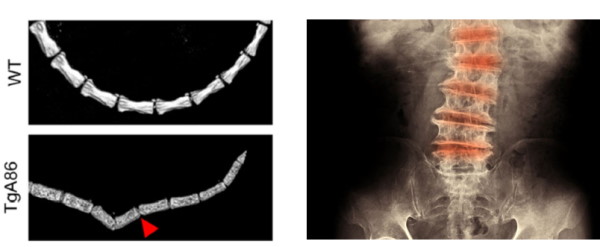16/10/2020
BSRC Fleming researchers Marietta Armaka and George Kollias, in collaboration with Biomedcode, published a new study in Arthritis Research and Therapy, introducing the TgA86 transmembrane TNF transgenic mouse as a novel model of human spondyloarthritis (SpA).
The specificity and complexity of human disease captured in a novel transmembrane TNF-driven mouse model of human spondyloarthritis
The authors show that the TgA86 mouse model develops spontaneously peripheral arthritis and axial spondylitis that closely reproduce key pathogenic features of human SpA, including its progression through the distinct stages of inflammation to subsequent ectopic new bone formation. The model captures the full spectrum of pathologies seen in SpA as it was revealed by the simultaneous manifestation of extraarticular comorbidities such as heart valve pathology and systemic bone loss. Moreover, similar to human patients, TgA86 mice respond efficiently to early treatment with anti-TNF therapeutics.
The identification of a novel mouse model that recapitulates SpA could prove an invaluable translational tool in the study of this complex group of chronic inflammatory disorders and in the evaluation of new therapeutic approaches.
Article:
Ectopic bone formation and systemic bone loss in a transmembrane TNF-driven model of human spondyloarthritis. Christodoulou-Vafeiadou E, Geka C, Ntari L, Kranidioti K, Argyropoulou E, Meier F, Armaka M, Mourouzis I, Pantos C, Rouchota M, Loudos G, Denis MC, Karagianni N, Kollias G. Arthritis Res Ther. 2020 Oct 6;22(1):232. doi: 10.1186/s13075-020-02327-4.
